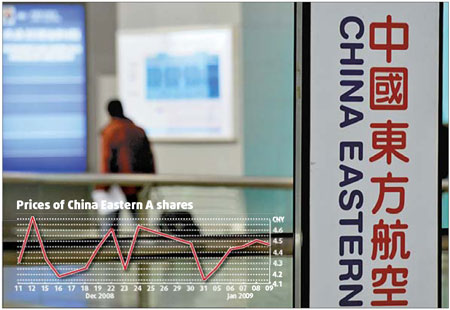Airline tries to ride out

SHANGHAI: An array of 256 measures are being formulated by China Eastern Airlines to stem further losses during the global economic recession, confirmed Luo Zhuping, board secretary with the country's third-largest carrier on Friday.
Luo told China Daily that the efficiency-oriented policies include cutting salaries across the executive suite, urging employees to take unpaid vacations and making other operating adjustments.
"These new policies will be designed to control costs," Luo said.
According to Luo, the pay cuts won't reach low-level employees. Management teams will see a 10 to 30 percent salary reduction, depending on their posts.
Some unprofitable flights (mostly international) will be closed down, said Luo.
Sources said China Eastern will pull out of several investment plans made during the first half of 2008. Luo declined to comment on those rumors. Public information shows China Eastern joined plans of establishing China Joy Air Co with China National Aviation Holding Company, and invested in Tibet Airlines.
In its third-quarter report, the Shanghai-based airline posted a loss of 2.334 billion yuan, with a 98.49 percent debt-to-equity ratio. Its passenger numbers fell 5.4 percent to 37.1 million throughout 2008.
As the worst-performing Chinese airline, China Eastern announced on Dec 29 it would raise 7 billion yuan by selling shares to its State-owned parent company, which will help ease the pressure of the company's mounting debts.
"At this stage, any decision made is to keep the business afloat. The overall airline industry was wracked hard by losing up to $5 billion last year, and domestic airlines might account for 10 billion yuan," said Xia Fulu, an analyst with Industrial Securities.
According to Xia, the sprawling financial crunch has greatly dented flight demand. Across the globe, nearly all airlines are marketing discounted tickets.
Suffering from last year's snowstorms in January, Wenchuan earthquake in May and Olympic restrictions, China Eastern's seat kilometer utilization dropped to 71 percent.
(China Daily 01/10/2009 page10)








